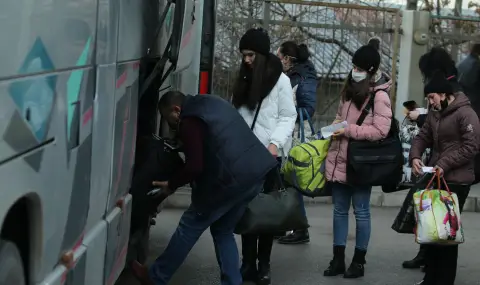Journalists from “Wiener Zeitung” Petra Tempfer and Simone Plank traveled by bus from Vienna to Sofia together with Bulgarian caregivers working in Austria. They used the 16-hour journey to learn more about the nature of these women's work.
One of them is 57-year-old Raya (name changed by the editors). She takes care of an 87-year-old man with dementia from Salzburg. “The work is so hard that no one wants to do it anymore. We are the last ones left", says Raya.
This is confirmed by another woman caring for a dementia patient in Austria, who did not know whether it was day or night, constantly walked around the apartment in her wheelchair and came several times every night to wake up her caregiver. A third colleague of theirs says that she was beaten and forced to work as a cleaner. “However, the system only works like this - with labor from abroad", assures Raya.
Cleaning 2,500 euros per month
The reason why they hire themselves out for this hard work quickly becomes clear. “In Austria you get a clean 2,500 euros per month", says Raya. This way she can afford a good life in her homeland - with a house with a large garden and another apartment. "When I get back, I'll take care of the garden first," she added.
The 24-hour babysitters are hired by Austrian agencies through intermediaries to work in both countries. Before starting work in Austria, they must complete a three-month training course. The duties are generally clearly defined - providing assistance with everyday activities such as washing, dressing or shopping, but not giving injections, for example (officially they are called chaperones). In addition, the agencies pay for bus trips and take care of the payment. There are also agencies that only mediate - with them, patients pay their babysitters directly, writes “Wiener Zeitung”.
The Austrian publication explains that there are also intermediary fees, which vary - some agencies charge several hundred euros per month, while others charge a one-time fee. There are also those who advertise themselves by not charging taxis.
From Sofia to Mezdra
From Sofia, journalists Petra Tempfer and Simone Plank continue to Mezdra to meet another 24-hour babysitter - Nicole (name changed by the editors). This is the first time she has not taken the bus home - after 30 years of working abroad, she bought a car for long trips.
“All young people are running away”, says Nicole. They go either to the nearby big city, or abroad, where there is a better education and a well-paid job. It's not about 24-hour care for elderly patients - 52-year-old Nicole is also one of the last to be involved in this activity.
She links the fact of Bulgaria's shrinking population to the end of communism in 1989 and the country's accession to the EU, which made it extremely easy to work and study abroad. But according to her, the main reason is something else: “Bulgaria is corrupt. The money just disappears”. In order to meet EU requirements, cheap materials are bought - for example, for the construction of the highway to Mezdra, and the rest of the money goes into the pockets of politicians, the woman says. “That's why everything is broken, the streets are full of potholes, no one wants to stay here."
Interest in looking after the elderly is declining
The Austrian publication does not fail to note that according to the Transparency International corruption index, Bulgaria ranks 76th out of 180 countries. And undeclared work, according to a study commissioned by “Visa”, amounts to 34.6 percent of GDP, which is the highest indicator in the EU.
Data is also provided on the interest in working 24-hourly to look after the elderly - over the past 20 years, the number of candidates to do this has halved - due to poor conditions and pay. Their average age is 54 years.
